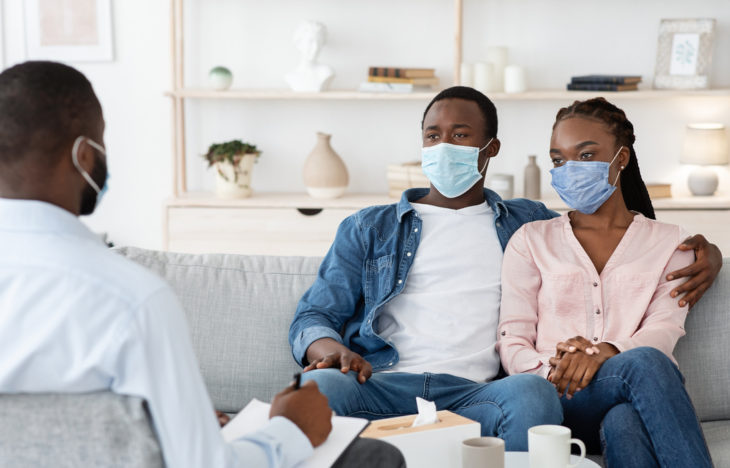
While the world waits in hopeful anticipation of the vaccine against COVID-19, you may be wondering if it’s safe to try to conceive. The answer is yes! Right now it appears that the vaccines will be made available in phases, with the most vulnerable, including healthcare and frontline workers being the first to receive, as soon as December. This means some sense of normal could return to the U.S. by early summer 2021.
If you and your partner have postponed IVF due to concerns about coronavirus you needn’t worry any longer. Since the early days of the coronavirus pandemic physicians have learned a lot more about the virus’ impact on IVF. There is absolutely zero evidence that the virus poses any threat, or has any effect at all, on your IVF outcome. It cannot be transmitted via IVF or IUI and poses no threat to testicular function in men or reproductive function in women.
Assessing The Risk Now That More Is Known
Initially, the American Society for Reproductive Medicine (ASRM) asked physicians and their patients to postpone IVF cycles unless there was an urgency. That was the most responsible way to address the concerns of physicians and their patients in the early days of the pandemic when little was known about the virus.
Now that more knowledge of the virus has been uncovered, the risks posed to patients and medical staff is found to be on par with the risks to the general public. The ASRM/Coronavirus/COVID-19 task force, formed to determine the potential for infection posed to those undergoing all fertility treatment, now recommends a judicious approach:
“Collectively, these updates recommend the judicious resumption of the delivery of reproductive care, with the use of careful preventive measures, such as the use of Personal Protective Equipment (PPE), including masks, frequent hand washing, and social distancing measures. Given the continued presence, and more recently the marked upsurge, of COVID-19 cases in much of the United States (U.S.), these strategies continue to be critical in managing this ongoing pandemic.”
How Coronavirus Impacts Pregnancy
In spite of the ASRM’s findings that there is relatively no risk to those undergoing fertility treatment, there has been evidence of a slightly elevated risk for pregnant women who contract COVID-19 during pregnancy for preterm delivery and preeclampsia. Should you test positive for COVID-19 while pregnant your physician will monitor you very closely.
Studies show that the virus is not transmitted via placenta, and newborns are not shown to be at risk for coronavirus infection or neonatal complications. For those couples anticipating IVF, or any other treatment for infertility, time is often ‘of the essence’. There’s no need to postpone due to the current pandemic, especially with a vaccine on the horizon.
The Vaccine for COVID-19 and Pregnancy
In an abundance of caution, pregnant women are considered part of the high-risk population when it comes to the coronavirus. With this in mind the vaccine is being assessed, though not yet in human trials, for safety and efficacy in pregnancy. The FDA is not expected to immediately approve any of the coming vaccines for pregnant women, at least temporarily.
The best practice, currently, for those women who are successful in conceiving, is to follow the CDC guidelines to the letter. Stay within your pod, limit all interaction with those outside of your home, and avoid social activities and encounters where the recommended general safety measures are not followed. Most importantly: Do not miss your healthcare appointments.
For those women who are undergoing IVF and wish to get vaccinated, speak with your physician as the latest updates are sure to change.
No Need to Put Growing Your Family On Hold Any Longer
COVID-19 and the world response to the pandemic, has already compromised life for so many of us. Many typical life events have been put on hold in hopes that this virus is eradicated, or at least gets under control. It appears we’re approaching a point where that may be true. In any event, don’t put your dreams of conceiving a child on hold any longer. It is absolutely safe for you to continue with your plans for IVF or any other fertility treatment.
If you have any questions or concerns, contact the medical staff at LA IVF. Remember to continue to take the proper precautions. Wear a mask, socially distance, avoid large gatherings and practice hand washing faithfully. If you suspect you may have been exposed to COVID-19 seek medical advice, get tested and quarantine away from others for 14 days. Together we will get through this pandemic.










